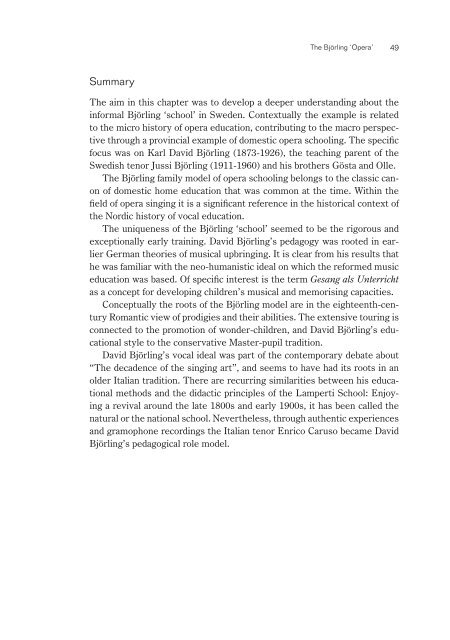Opera on the Move in the Nordic Countries during the Long 19th ...
Opera on the Move in the Nordic Countries during the Long 19th ...
Opera on the Move in the Nordic Countries during the Long 19th ...
Create successful ePaper yourself
Turn your PDF publications into a flip-book with our unique Google optimized e-Paper software.
Summary<br />
The Björl<strong>in</strong>g ‘<str<strong>on</strong>g>Opera</str<strong>on</strong>g>’<br />
The aim <strong>in</strong> this chapter was to develop a deeper understand<strong>in</strong>g about <strong>the</strong><br />
<strong>in</strong>formal Björl<strong>in</strong>g ‘school’ <strong>in</strong> Sweden. C<strong>on</strong>textually <strong>the</strong> example is related<br />
to <strong>the</strong> micro history of opera educati<strong>on</strong>, c<strong>on</strong>tribut<strong>in</strong>g to <strong>the</strong> macro perspective<br />
through a prov<strong>in</strong>cial example of domestic opera school<strong>in</strong>g. The specific<br />
focus was <strong>on</strong> Karl David Björl<strong>in</strong>g (1873-1926), <strong>the</strong> teach<strong>in</strong>g parent of <strong>the</strong><br />
Swedish tenor Jussi Björl<strong>in</strong>g (1911-1960) and his bro<strong>the</strong>rs Gösta and Olle.<br />
The Björl<strong>in</strong>g family model of opera school<strong>in</strong>g bel<strong>on</strong>gs to <strong>the</strong> classic can<strong>on</strong><br />
of domestic home educati<strong>on</strong> that was comm<strong>on</strong> at <strong>the</strong> time. With<strong>in</strong> <strong>the</strong><br />
field of opera s<strong>in</strong>g<strong>in</strong>g it is a significant reference <strong>in</strong> <strong>the</strong> historical c<strong>on</strong>text of<br />
<strong>the</strong> <strong>Nordic</strong> history of vocal educati<strong>on</strong>.<br />
The uniqueness of <strong>the</strong> Björl<strong>in</strong>g ‘school’ seemed to be <strong>the</strong> rigorous and<br />
excepti<strong>on</strong>ally early tra<strong>in</strong><strong>in</strong>g. David Björl<strong>in</strong>g’s pedagogy was rooted <strong>in</strong> earlier<br />
German <strong>the</strong>ories of musical upbr<strong>in</strong>g<strong>in</strong>g. It is clear from his results that<br />
he was familiar with <strong>the</strong> neo-humanistic ideal <strong>on</strong> which <strong>the</strong> reformed music<br />
educati<strong>on</strong> was based. Of specific <strong>in</strong>terest is <strong>the</strong> term Gesang als Unterricht<br />
as a c<strong>on</strong>cept for develop<strong>in</strong>g children’s musical and memoris<strong>in</strong>g capacities.<br />
C<strong>on</strong>ceptually <strong>the</strong> roots of <strong>the</strong> Björl<strong>in</strong>g model are <strong>in</strong> <strong>the</strong> eighteenth-century<br />
Romantic view of prodigies and <strong>the</strong>ir abilities. The extensive tour<strong>in</strong>g is<br />
c<strong>on</strong>nected to <strong>the</strong> promoti<strong>on</strong> of w<strong>on</strong>der-children, and David Björl<strong>in</strong>g’s educati<strong>on</strong>al<br />
style to <strong>the</strong> c<strong>on</strong>servative Master-pupil traditi<strong>on</strong>.<br />
David Björl<strong>in</strong>g’s vocal ideal was part of <strong>the</strong> c<strong>on</strong>temporary debate about<br />
“The decadence of <strong>the</strong> s<strong>in</strong>g<strong>in</strong>g art”, and seems to have had its roots <strong>in</strong> an<br />
older Italian traditi<strong>on</strong>. There are recurr<strong>in</strong>g similarities between his educati<strong>on</strong>al<br />
methods and <strong>the</strong> didactic pr<strong>in</strong>ciples of <strong>the</strong> Lamperti School: Enjoy<strong>in</strong>g<br />
a revival around <strong>the</strong> late 1800s and early 1900s, it has been called <strong>the</strong><br />
natural or <strong>the</strong> nati<strong>on</strong>al school. Never<strong>the</strong>less, through au<strong>the</strong>ntic experiences<br />
and gramoph<strong>on</strong>e record<strong>in</strong>gs <strong>the</strong> Italian tenor Enrico Caruso became David<br />
Björl<strong>in</strong>g’s pedagogical role model.<br />
49
















